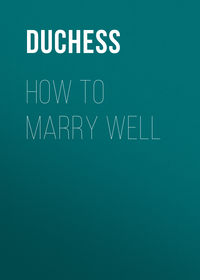 полная версия
полная версияA Bachelor's Dream
Miss Boucheafen, making great haste over the toilet of her pupils, had them ready and was ready herself before Ellen, and filled up the spare time by pacing the hall from end to end as she waited. Not hastily – the perfect grace of her every motion was too complete for haste – not even impatiently, for the set expression of her face never changed, and no flush of excitement tinted the ivory pallor of her cheeks. If her eyes were a little brighter, a little wider open than usual, it was very little. Mrs. Jessop, passing through the hall as the governess and pupils waited, confessed to herself, with reluctant honesty, as she looked at the stately young figure in its plain dark dress, that there was no denying that "Ma'm'selle" did look like a queen.
It was the beginning of May, and, for a wonder, hot and bright enough almost for July; the afternoon sun shone down warm and brilliant. As Alexia stepped out into its glare, she stopped and almost staggered, putting her hand to her throat, while she shivered violently. The round-eyed maid, watching, was quite sympathetic. No wonder she felt odd, poor young lady, remembering what had happened to her the last time she was out!
"Where shall we go?" demanded Tom, tugging at Alexia's hand.
"Want to go an' see Mrs. Yeslie," murmured Maggie.
"I'm going to look at the shops," declared Floss with emphasis. "I can spend my shilling if I want to, Uncle George said!"
"No, no – not to-day," demurred the governess, quickly. "Listen, children. The shops you can see any day – to-morrow, perhaps; but to-day we will go somewhere else."
"Where else?" demanded Floss, critically, with a fond look at the shilling which he had drawn out of his knickerbocker pocket.
"Into the park," said Alexia. "We will all ride there in a tram-car.
You will like that?"
"Finsbury Park?" questioned Tom. "Oh, all right! I don't mind. Only, I say, let's go up to the water where the ducks are!"
"Yes – let's," added Floss, restoring the shilling to his pocket.
"Want's some buns to feed 'em wiv, poor fings," murmured Maggie, with pathetic intonation.
"Yes, you shall go [to] the water and have the buns," said Alexia. She had been walking rapidly all this time – almost too rapidly for the little feet trotting beside her – and did not pause or speak until they reached Highbury Corner, which was more crowded and busy than usual this warm afternoon. A tram-car was waiting, and she hurried her charges into it, taking no heed of Tom's desire to sit where he could see the horses, or of Floss's loudly-expressed determination to ride on the roof. She took her seat, and, leaning back, drew her black gossamer veil tightly over her face, and closed her eyes, seeming to become totally oblivious of her surroundings.
Ellen, sitting with Maggie on her knee, distracted by Tom's ceaseless questions upon the one side and by Floss's incessant demands to be put out on the roof upon the other, felt a little sulky and injured. Really it was too bad of mademoiselle! If she came out with the children she might at least take her share in amusing and keeping them quiet. Ellen, at any rate, was not sorry when the park-gates were reached. A plentiful supply of buns was procured, and the children, with shrill screams and whoops of delight, started off for the ducks and the water.
"Oh, dear," cried the nursemaid, quite dismayed at suddenly finding herself alone with the governess, "they'll lose themselves, Ma'm'selle! There's such a many other children about we shall never find 'em."
"Keep them in sight, then," said Alexia. "Follow them, Ellen. You had better not wait for me. My head aches, and I cannot walk fast."
"But we shall lose you, too, Ma'm'selle," demurred the girl, hesitatingly.
"No, no; I will follow you slowly. Go; they may fall into the water if you linger."
"Miss Maggie's nigh sure to, with they buns!" said the girl, taking the alarm, and without any more loitering she darted after the runaways.
Alexia did not follow. For a moment she stood on the broad gravel walk looking about her. Groups of figures were scattered about the smooth turf – young ladies with novels; old ladies with crochet and poodles; nurse- [here a lack in the original text] The girl looked, not at, but around and beyond them; her great eyes seemed to be searching, as if surprised at not seeing something, and yet dreading to see it. Then their expression changed; for a moment her figure swayed; the next she was walking gracefully, slowly, languidly, toward a rustic seat which stood upon the smooth greensward in a somewhat lonely spot. It stood at an angle formed by two flower-beds, and was backed by a clump of shrubbery. Upon it there was one figure seated – that of a man.
The governess approached this figure slowly. A middle-aged man, loosely-dressed, hair turning gray, dark-complexioned, with a scar on his cheek, a scar such as a slash with a keen-edged knife might have made. She approached and passed him; she did not look at him; he did not look at her; he appeared to be quite absorbed in absently cutting and fashioning a rough stick with the aid of a large clasp-knife. He gazed before him abstractedly, brushed the splinters of wood from his knee, and laid the knife down upon the seat beside him, the edge of the blade uppermost. The girl shuddered; the ivory pallor of her cheeks grew gray beneath her veil. She passed on round the clump of bushes and returned. The man had abandoned his whittling, and, with his chin upon his hand, whistled as he looked down at the grass at his feet. His right hand played absently with the open knife; now the edge was upward, now downward, now he half closed it, then opened it wide again. Alexia Boucheafen's breath came rapidly; one violent throb of her heart almost suffocated her; but, graceful, upright, stately, she passed the seat as though it were vacant; she did not appear to glance at the man sitting there, toying with the knife, and whistling under his breath. She passed him, and, as she did so, her gloved hand made a swift motion, and a white object gleamed upon the turf behind her. A paper had fluttered from her fingers, and lay close to the rustic seat.
Tom, Floss, and Maggie, flinging pieces of bun to voracious ducks, were delighted – far too absorbed to remember their governess; and Ellen, finding herself fully occupied in keeping their hats on their heads and themselves outside the railings that surrounded the lake, had also forgotten Miss Boucheafen completely. The girl was quite startled when she saw the tall dark figure suddenly beside her, the great bright eyes shining through the black veil. And how pale she was – her cheeks were quite white!
"Lor, Ma'm'selle," she cried, with loud-voiced sympathy, "how bad you do look!"
"I'm tired," said Alexia abruptly. "Children, are you ready to go?"
"Ready? Why, we ain't had half a walk!" demurred Tom.
"I'm hungry!" exclaimed Floss, tugging at Miss Boucheafen's gown. "Maggie went an' threw all the buns to the ducks, she did – little stupid."
"You 'tory, I never! You eatened two yourself, you did," Maggie declared indignantly. "You's a geedy boy – a dedful geedy boy! Isn't he a geedy boy, Ma'm'selle?"
"Never mind, we will get more buns as we go out," said Alexia. "Come now, children. I am tired – my head aches. We will come some other time – to-morrow perhaps – and stay longer. Come now."
They walked away from the water, and gained the broad path leading to the gates. Alexia slackened her pace, and, releasing Floss's hand, but still retaining Maggie's, fell slightly behind, sauntering slowly, playing with the buttons of her cloak, keeping her eyes fixed straight before her. They were passing a seat close to the edge of the path, upon which a man was sitting – a middle-aged, loose-jointed man with gray hair. A bright object lay at his feet – a small ball of gorgeous tints; the child saw it, uttered a delighted cry, and struggled to release her hand. It was released and she started to pick up the prize. It was hardly in her grasp when she screamed out, frightened, for the man with the gray hair had taken hold of her arm, and was speaking to her, not roughly, although his voice was harsh and stern.
"My little one – see, the lady has dropped this paper. Give it to her; and as for this bauble, take it. Go!"
He released her. The child was scared, but she held in one hand the paper he had given to her, in the other the gay-colored ball. He pointed peremptorily after the tall retreating figure of Alexia Boucheafen, and, frightened at his frowning face, the child darted toward "Ma'm'selle."
"Ma'm'selle, Ma'm'selle!" She tugged at the governess's dress, at her hand. "'Ook what he dave me!" – holding up the ball. "Nice, nice man, vewy nice! Floss s'an't have it, he s'ant – Floss a geedy boy. He dived it me for meself. Oh, an' yes!"
With a sudden remembrance of something less absorbing than the ball, she held up the paper – a mere folded scrap. Alexia seized it eagerly, held it fast in her hands, asked almost inaudibly:
"Who gave it to you, child?"
"Him did. You droppened it. Him," said the child, turning round to point. Then she cried out blankly, "Oh, him's gone!"
Miss Boucheafen glanced behind her hastily. The seat by which the gay-colored ball had lain was empty. She opened the paper, and read within it, written in a blood-red color, the one word "Absolved!"
* * * * *
Doctor Brudenell found his nephews and niece unusually excited and talkative when, as was his custom, he came up after his dinner to see them in Miss Boucheafen's pleasant sitting-room. The rides in the tram-cars, the park, the buns, and the ducks were enlarged upon in turn; and then Maggie produced her ball, and plunged onto such broken and lavish praises of the "vewy nice man" that the Doctor looked at the governess for enlightenment.
"A gentleman in the park, sir, gave her the ball," explained Miss
Boucheafen gravely.
"And zou a letter!" cried Maggie.
"And also returned me a paper that I had dropped," amended Alexia.
"I see. Well, don't smash more windows with the ball than you can help," said the Doctor, putting his niece down upon her feet.
He rose and approached the stately young governess, standing, beautiful in the light of lamp and fire, one hand drooping at her side, the other lying upon the marble of the mantel-piece, hardly whiter and hardly colder. George Brudenell had begun to think that her coldness and gravity suited her beauty – laughter, blushes, dimples would have spoiled it. Her frigid manner did not repel him now; it had a charm for him which no warmth and graciousness could have had; and yet, perversely he longed intensely to see her both kind and sweet. How beautiful she was! He glanced at her reflected face in the mirror, and winced and frowned and bit his lip, seeing his own beside it. A small, plain, dark, clean-shaven man – he was her very antithesis. Intellectual-looking, pleasant, refined he might perhaps claim to be considered; but how utterly, painfully unattractive he must be to her!
"I am glad to hear that you have been out, Mademoiselle," he said kindly.
"The day was so fine – it tempted me," replied Alexia.
"A very good thing; the confinement was telling upon you," resumed the
Doctor. "Let me advise you to try to get out once at least every day."
"I shall do so, sir, with your permission – now."
"Now that the first plunge is taken," he remarked good-humoredly. "Well, that is wise. Do not go too far, or let these youngsters trouble you too much either out of doors or in, and you will soon feel the benefit."
"You are very good, sir," murmured the governess; "but I am quite well – indeed, quite strong."
"You must let me be the best judge of that, Mademoiselle. I am afraid you have overtaxed your strength to-day. You are looking tired."
"I am not so, indeed. Not at all too tired to play, if you desire it."
"Thank you, Mademoiselle," said the Doctor simply.
There was a piano in the room, a tolerable one; and Alexia moved slowly toward it and sat down. It had become quite an institution, this half-hour's playing which she gave the Doctor when he came up-stairs to bid the children good-night. He was disappointed if by any chance she missed it, perhaps because he hardly saw her at any other time, and because it was something to be able from his distant seat to watch her as she played. He learned her attitudes, her expressions, the poise of her head, the curve of her full throat by heart at these times.
He did not care for music, and had no knowledge of the airs she played, but he knew that he had heard no playing like hers. The magic of her fingers made the instrument speak.
Thanking her now, he did not leave the room as usual, but lingered even after the children had said good-night and gone to bed. Alexia looked at him questioningly, and he began to speak – awkwardly, as she saw, but with how much reluctance she did not suspect.
"Mademoiselle, you will pardon my recalling it. But you recollect when you first expressed a wish to remain here?"
"Yes."
She spoke quite quietly, but her eyes involuntarily widened and her lips parted. She put her hand to her bosom, felt the stiffness of paper there, and then the hand fell at her side again, and she sat looking at the fire.
"You recollect," resumed George Brudenell, with a reluctant troubled glance at her averted face, "that I told you then how perfectly aware I was that the post you wished to fill was completely below your capabilities – that in it you would be thrown away, in short – and that at the best it could only be considered as an occupation for you until something better should offer?"
"I remember, sir."
The Doctor hesitated; that "sir," with its stiffness, its cool, formal, respect, jarred upon him more and more day by day; and she hardly ever failed to use it. He was too diffident to remonstrate with a few gay words, as a more confident, easy man would have done, and chafed under it in silence.
"I am happy to tell you that something has offered."
It was a lie, and he knew it; the thought of losing her, cold and statuesque as she was to him, made him miserable, filled his heart with a keen pain – a pain which had brought very near the inevitable revelation that he was bound to make to himself. Alexia raised her head and looked at him, but she did not speak. He went on:
"It is in the family of one of my patients – not as governess, but as companion to his wife. They are wealthy, and she is a refined, cultivated, and kindhearted woman; you could, I think, hardly fail to be comfortable with her, if you care to accept the post." He paused again, but finding her still silent, went on. "That you would be upon terms of perfect equality I need not say. This lady – Mrs. Latimer – would like to see you, if you care to think further of it."
Alexia looked into his face with her great sombre eyes.
"Sir, do you then wish me to leave here?"
"Wish?" he echoed.
Was there really a sorrowful, almost reproachful, intonation in her voice? He was foolish enough to fancy so, weak enough to encourage this sudden rapid beating of his heart.
"Because, if not," she went on gently, "I would rather stay here, if I may."
"Mademoiselle, are you sure of that? Consider."
"Quite sure. I am comfortable – here it is home; you have been so kind to me! Ah, sir, do not send me away!" She spoke entreatingly, eagerly, and to herself she added, pressing her hands again upon her breast, "If he sends me from the house, I am lost."
"My child," said George Brudenell simply, again remembering only how young she was as he spoke to her thus protectingly, "stay if you wish, and as long as you wish. You shall leave only when you yourself desire it."
"I shall not do that," murmured Alexia softly; and then, having no further excuse for remaining, he went away.
The Doctor fell into a reverie before his study fire presently, and forgot the book upon his knee. He had the pleasant consciousness of an uncongenial task conscientiously performed, and without its anticipated unwelcome results being left behind. It was not an idea of his own which had caused him to inquire among his patients for a suitable situation for Alexia Boucheafen, but the hints, and then downright urgings, of his friend Mrs. Leslie. Both she and Kate Merritt had seen the governess, for in her kindness of heart the elder lady had paid more than one visit to Laura's children. Mrs. Leslie had been astonished at Alexia's beauty and stateliness, sympathetic and questioning over her story, and, upon hearing that she was to remain in the Doctor's house, had been amazed. A conventional-minded woman, with all her kindness of heart, Mrs. Leslie had been shocked. Perhaps she might not have been so had there been no scandalized and indignant influence upon her own side; but Kate had been excessively voluble upon this incipient fulfillment of her predictions, and had let her sister have very little peace indeed. Finally, Mrs. Leslie had summed up the whole case to the Doctor by assuring him that it would never do.
Well, it would have to do, he decided, when he roused himself sufficiently to know what he had been thinking about. The girl should stay if she preferred it, that was certain, in spite of all the opinions in Christendom. He rather enjoyed this outrage upon the proprieties, forgetful altogether that the same thought had been in his own mind. He was glad to know that she was tranquil and safe. Nothing more, consciously, yet.
CHAPTER V
"Ma'm'selle, didn't you say we could go to the park again, if we were good?" said Tom, looking up from a smeary attempt to get a simple addition sum "to prove," and sucking his pencil doubtfully as he surveyed the result.
"Don't want to go to the park; want to go to the shops an' spend my shilling," exclaimed Floss, dropping a prodigious blot upon his copy of capital "B's," and instantly smearing it over the page with his arm.
"S'all go to the park, I s'all! Wants to see the ducks, pour fings, an' the nice man," cried Maggie, as usual completing the trio, and screwing up her face over the mysteries of "a, b, ab."
"Can't we go, Ma'm'selle?" demanded Tom.
"Go where?" asked Alexia. She had been leaning against the window-frame, staring out blankly. Her face was paler than usual, the lines of the mouth more rigid, her hair even more coldly absent and abstracted. Her pupils had spoken to her half a dozen times, and she had not heard them, would not have heard them now, had not Tom tugged impatiently at her gown.
"Why, to the park, as we did last week? Can't we go?"
"I don't know; we will see. Get on with your lessons now. What is that?
Come in."
A tap had sounded at the door, which was now opened, and the Doctor entered. The children scrambled down from their seats and ran to him. Miss Boucheafen, turning from the window, arched her straight brows with an expression of questioning surprise. For Doctor Brudenell to appear in the school-room at that hour in the morning was an unprecedented event.
"Good-morning, Mademoiselle." He took the cold, carelessly-yielded hand into his own for a moment. "Don't let me disturb you. I simply came up to express my hope that you were not alarmed last night."
"Alarmed?" echoed Alexia.
"Then you did not hear it?" – with a look of mingled relief and astonishment. "Well, I am glad of it. But you must sleep very soundly. You were the only person in the house who was not aroused."
"I sleep very soundly." She looked at him keenly, noting that his face was drawn and that his eyes were dull, showing that he had not slept. "I did not know there was anything wrong. Not here, I hope?"
"No, not here exactly; but it is a most horrible thing." He drew a pace nearer to her, dropping his voice so that the sharp little ears that were all eagerly listening should not catch the words. "A most horrible thing. A murder, Mademoiselle!"
"A murder?" repeated Alexia.
"Nothing less; and not a hundred yards away from this door."
Miss Boucheafen had leaned back, almost fallen, against the window-frame. She was so pale that he said hastily:
"I beg your pardon – I spoke too abruptly. I have frightened you."
"No, no; I am not frightened. Go on, pray! How was it? Who was it?"
"As to who it was – a man. As to how it was, he was stabbed to the heart," answered the Doctor shortly.
"And he was found dead, and brought here?"
"Yes, at three o'clock this morning, and brought here by the police. But he was dead, and had been dead for at least half an hour. I could do nothing."
"How horrible – how very horrible!" murmured Alexia. "Did you say, sir, that he was an old man?"
"No; he is little more than a lad – a mere boy – nineteen or twenty at the most. A handsome lad too; I should fancy he was not English."
"Is there any clue as to who did it?" questioned the governess.
"Not that I know of yet. The police have had no time to work, you see," he reminded her gently.
"Ah, yes; I was forgetting, sir! Have they taken it away?"
"From here? Not yet. It must be removed to the mortuary to await the inquest, of course." He hesitated, and then added, in a voice which, in spite of all his efforts, was almost tender, "You are not afraid of its being here, are you?"
"Afraid!" A smile, as curious as fleeting, parted the beautiful lips of
Alexia Boucheafen. "No, I am not afraid. I asked, because – Sir, may
I see it?"
"See it?" George Brudenell was so startled and shocked that he doubted if he had heard aright. "Surely, Mademoiselle, you do not mean what you say?"
"Yes – if I may." She spoke quite steadily and coldly. "I should like to see him – this poor murdered boy, if I may. I have never seen death, and I should like to know how it looks to be stabbed to the heart."
Surely a strange uncanny fancy in this lovely young creature! There was something morbid about it, which the Doctor did not like; it almost repelled him until he recollected how nearly this very fate had been hers. He did not like assenting, but already he was so weak with regard to her that he could refuse her nothing. So he said reluctantly:
"Come now then, if you wish."
Quite quietly, only bending her head by way of reply, she followed him out of the room and down-stairs to an apartment on a level with the hall, where the murdered man had been carried. On the threshold he stopped, looking at her doubtfully.
"Mademoiselle, are you sure of yourself? This is no sight for you."
"Yes," she answered steadily. "Pray do not fear, sir; I shall not faint. Let me see."
He stood aside and let her enter the darkened room. The blinds were drawn down, cooling liquids had been sprinkled about, there was nothing to horrify, nothing to disgust. The rigid figure, covered with white drapery, lay stretched upon the table. Without faltering, Alexia advanced, and, removing with a steady hand the cloth at the upper end, looked at the dead face thus revealed.
A boy's face, indeed, beautiful even in death, smooth-cheeked, the dark down on the delicate upper lip hardly perceptible, the black hair clustering upon the white forehead almost like a child's. The governess looked at it long and steadily, and one hand went to her bosom as she raised her eyes to the Doctor's.
"Tell me – did he suffer much?"
"No – impossible. Death must have been almost instantaneous. I doubt if he was able to cry out. Pray come away, Mademoiselle – you will faint. I should not have let you see this."
A voice in the hall called the Doctor. He was wanted, had been sent for in haste, some one was dying. He went quickly to the door to reply. Alexia Boucheafen bent down, her hand gently swept the hair from the dead boy's forehead, and for a moment her lips rested upon it.
"Poor boy," she murmured – "you were too young, too weak! It was cruel.
I did my best to save you, but I could not."
"Mademoiselle, pray come," said the Doctor, turning from the door.
"I am coming, sir," replied the governess; and with that she gently replaced the sheet, and followed him quietly from the room.
* * * * *
Doctor Brudenell had a busy day, a day so filled with work that, coming after his sleepless night, it exhausted him. It was later than usual when he reached home, to find his dinner spoiled and Mrs. Jessop's temper ruffled. So tired was he that, when the meal was over, he fell asleep in his chair, entirely forgetting for once his regular visit to Miss Boucheafen's sitting-room to bid the children good-night. But his thoughts were all of her; and he dreamed of her as he sat – dreamed that she was in some trouble, grief, danger, of which he did not know the nature, and was helpless to relieve.









